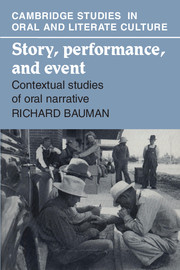3 - “We was always pullin' jokes”
The management of point of view in personal experience narratives
Published online by Cambridge University Press: 05 June 2012
Summary
Fabrications – both enacted and narrated – represent a fertile field for the exploration of the interrelationships binding together the narrated event, the narrative itself, and the event in which the narrative is recounted, as we saw in the preceding chapter. This chapter pursues this same problem from another direction, with reference to a further class of fabrications that has traditionally represented a productive resource for storytellers, namely, practical jokes.
There has been a notable and productive convergence of interest in recent years among linguists, sociologists, and folklorists around the nature and function of oral narratives of personal experience. William Labov has taken the lead among linguists in pursuing this subject of inquiry, using the texts of oral narratives of personal experience in the classic linguistic tradition as extended forms of natural discourse, but extending his analysis of structure beyond sentence grammar to encompass the narrative as a whole (Labov 1972, 1982; Labov and Waletzky 1967). From the standpoint of sociology, Erving Goffman has examined stories of personal experience as important instruments in the operation of the interaction order, including the presentation of self and the construction and communication of a sense of situational reality (Goffman 1959, 1974). And among folklorists, Sandra Stahl has directed the attention of her colleagues in a number of significant publications to this most ubiquitous of contemporary narrative forms, stressing the continuities between personal experience stories and other genres of folk narrative (Stahl 1977a,b, 1983).
- Type
- Chapter
- Information
- Story, Performance, and EventContextual Studies of Oral Narrative, pp. 33 - 53Publisher: Cambridge University PressPrint publication year: 1986



